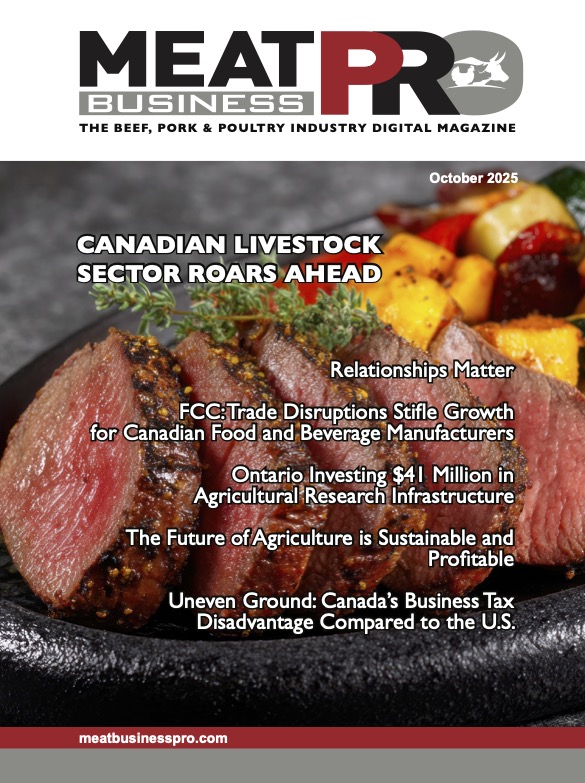NAMI to Senate Ag: Cattle Prices are at seven year highs!

With cattle prices at seven-year highs following record beef production in February and March as the packing sector recovers from COVID-related labor shortages and supply chain issues, the North American Meat Institute today urged members of the Senate Committee on Agriculture, Nutrition and Forestry to reject the Grassley-Fischer bill’s mandates and federal intrusion in the beef and cattle markets
“Leading agricultural economists have determined Grassley-Fischer bill’s latest draft remains costly to producers, especially producers in Texas, Oklahoma and Kansas where the majority of US fed cattle are raised,” said Meat Institute President and CEO Julie Anna Potts. “Due to a shrinking herd and sustained consumer demand, cattle prices are at seven-year-highs without federal intervention in the market.”
Economists from the Agricultural and Food Policy Center at Texas A&M University foundthat the latest Grassley-Fischer bill, S. 4030, could cost producers even more than an earlier estimate of $112 million over five years ($50 a head on 2.3 million head).
“A duplicative regulatory office is wasteful and unnecessary, and a political appointee leading a regulatory enforcement office such as this would have to respond to the political whims of the administration“The economists found the mandate would have regional disparities: the Texas-Oklahoma-New Mexico region, Kansas, and Nebraska would shoulder the vast majority of the costs, while the Iowa-Minnesota region would escape relatively unscathed.
There has been no economic analysis of the Grassley-Fischer Bill requested by its authors to counter these findings.
Potts submitted comprehensive written testimony on behalf of the Meat Institute and its members for the Senate Agriculture Committee hearing entitled, “Legislative Hearing to Review S. 4030, The Cattle Price Discovery and Transparency Act of 2022, and S. 3870, The Meat and Poultry Special Investigator Act of 2022.”
In her testimony Potts says,
“…applying the cash market mandate to only the largest packers reveals the proposed mandate for what it is: a punitive tool. Under the latest version of the bill, if a beef packer gets too large, they will be forced to buy a certain percentage of cattle on the cash market. Gone is the illusion that the cash market is somehow more virtuous than other means of marketing cattle; gone is the argument that the cash market is necessary for transparency and price discovery. Instead, the cash market mandate is just that: a government mandate designed to punish the largest companies and their suppliers. In this sense, the mandate is an antitrust tool that could be used in any industry. If a company gets too large, it will be punished with a government mandate directing how the company can purchase inputs. Such a government mandate should elicit opposition from anyone interested in protecting the free market.”
Potts’ testimony also addresses The Meat and Poultry Special Investigator Act of 2022 which duplicates existing regulatory enforcement authority and is unnecessary.
The Packers and Stockyards (P&S) Division currently investigates allegations of impropriety and brings administrative cases and levies fines when warranted. Under certain circumstances, the P&S Division takes civil action working through the Department of Justice. Penalties for violations of the Packers and Stockyards Act (P&S Act) can include civil penalties, injunctions, fines, and even jail sentences.
The bill would create a new office led by a political appointee with the same responsibilities for enforcing the same authority, the P&S Act, as the current P&S Division has. A duplicative regulatory office is wasteful and unnecessary, and a political appointee leading a regulatory enforcement office such as this would have to respond to the political whims of the administration.
Just this year, USDA established a complaint portal for producers to use to submit allegations of P&S Act violations to USDA and DOJ. The new tool provides producers and the P&S Division another resource for submitting, evaluating, and prosecuting violations. If the P&S Division staff are not doing their jobs, there are other ways to address it than by adding a political appointee into the regulatory and enforcement mix.
“USDA is promulgating new proposed rules under the P&S Act…” Potts said. “Establishing a politically appointed Special Investigator at the same time is a regulatory time-bomb. The Special Investigator (and staff) would feel emboldened and obligated to bring as many cases as possible, whether warranted or not, to push the legal limits of the new rules. The resulting legal uncertainty and chaos will accelerate changes in livestock and poultry marketing that will likely add cost to producers and packers and up-end the supply chain.”











